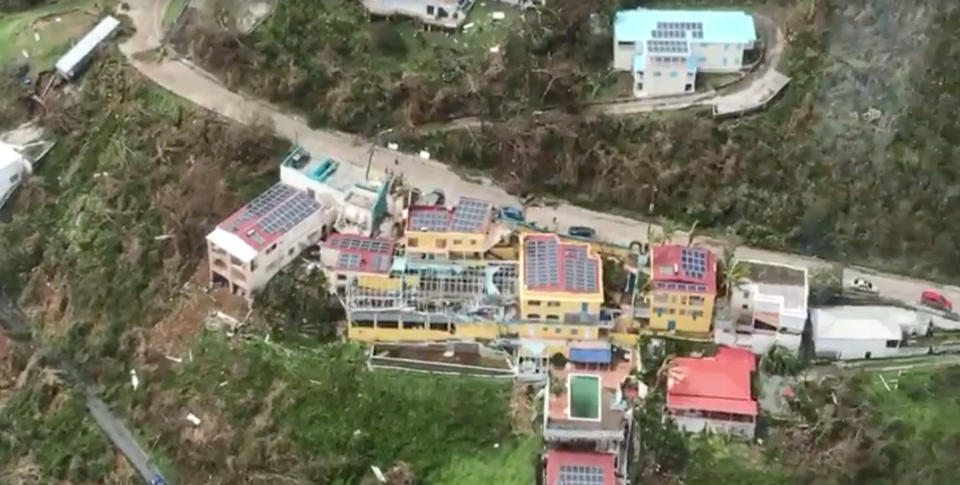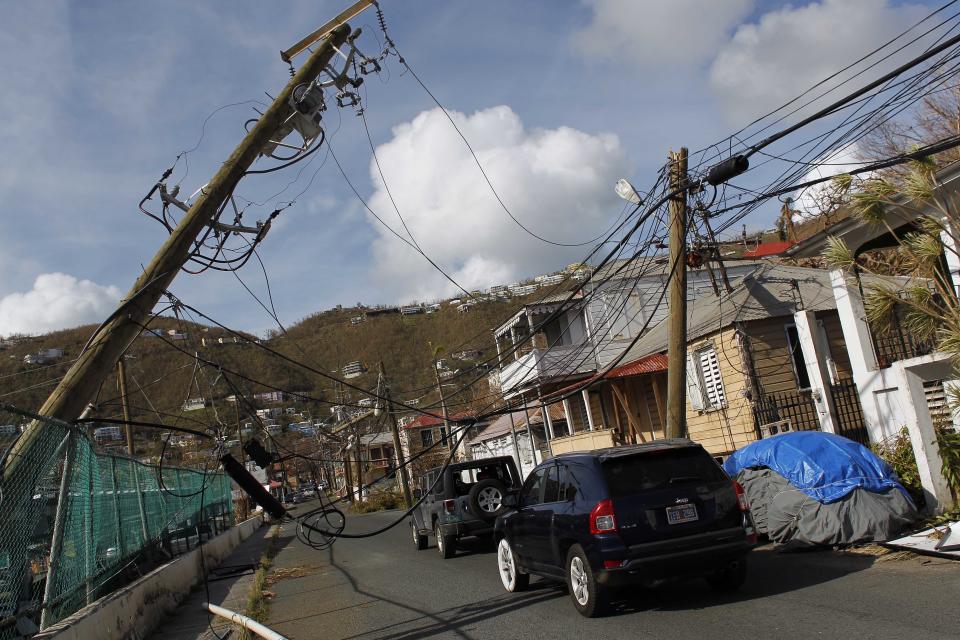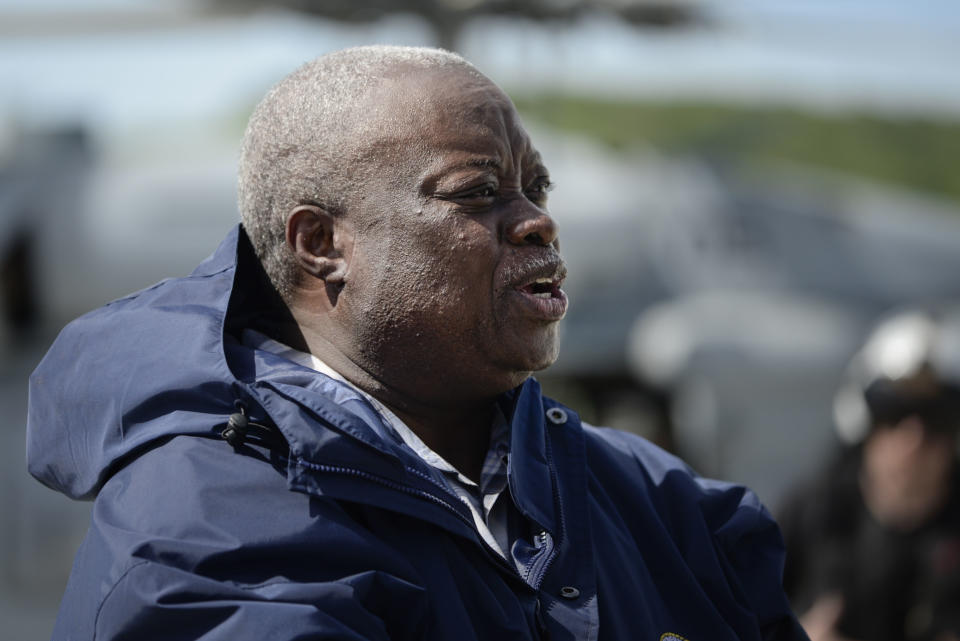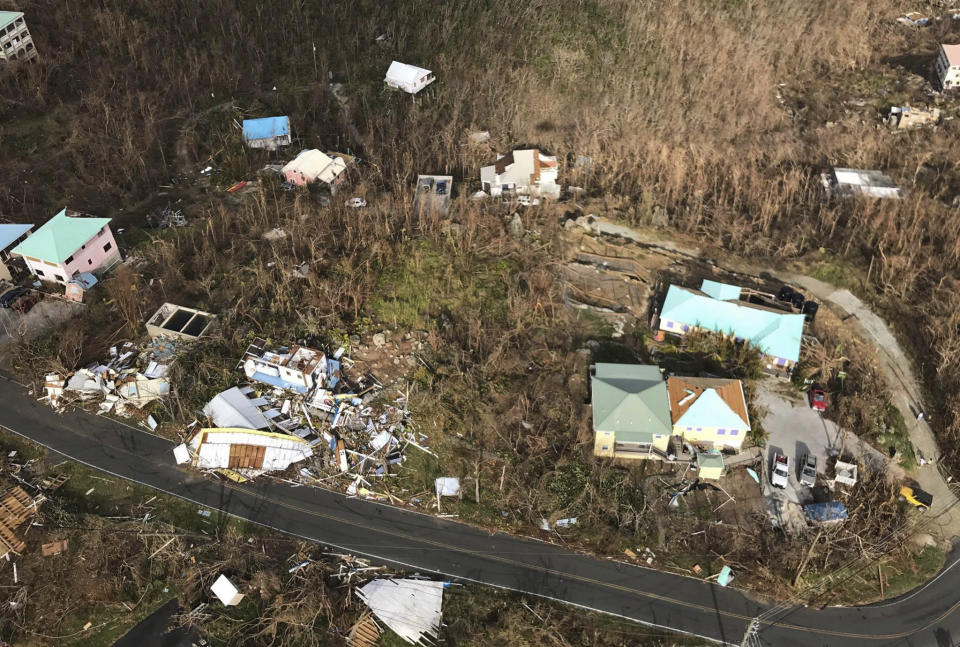Hurricane Irma 'couldn't happen at a worse time' for the US Virgin Islands
Hurricane Irma, a Category 5 storm that packed winds of 185 miles per hour, ravaged the U.S. Virgin Islands last week, leaving destruction in its wake. At least four people died in the territory.
“The damage is just extensive and just horrific to look at,” Congresswoman Stacey Plaskett, who represents the Virgin Islands, told Yahoo Finance as she boarded a boat from St. Croix to visit the other islands of the U.S. territory. “The entire island looks burnt from the salt blast of the waters and the wind that hit the islands.”
The U.S. Virgin Islands is made up of three main islands — St. Thomas, St. Croix, and St. John. St. Croix avoided most of the damage and is now acting as a hub for the relief efforts taking place on St. Thomas and St. John, which endured the brunt of the storm.
In the storm’s wake, reports of crime were shared widely on social media. These stories as well as the images of crumbled buildings, wrecked boats and cars, toppled trees and downed power lines are distressing. And to make matters worse, the storm hit just ahead of the islands’ critical winter tourism season. All of this falls against the backdrop of the tremendous financial stress already affecting the region.

“It couldn’t happen at a worse time”
Plaskett said most of the resorts on St. John are gone, as is critical infrastructure, including schools, clinics and post offices. On St. Thomas, the hospital lost its roof and walls caved in, while the airport terminal suffered substantial damage including the loss of its air traffic control system. She added that other government infrastructure, including a fire station and a police station, was also lost.
“It’s going to take years before our island recovers, and we’re going to need the full support of the United States,” Plaskett said.
It’s been a difficult time for the U.S. Virgin Islands. The territory has been facing significant financial challenges, driven by an increasing governmental deficit, high levels of debt and unfunded pension obligations.
“[Irma] couldn’t happen at a worse time because the government lost a lot of the infrastructure,” Clifford Graham, a former senator for the Virgin Islands Legislature, told Yahoo Finance in a phone interview.
“The government, at this unfortunate time, will have to spend money to get these facilities up and running,” added Graham, who’s now the president and CEO of The West Indian Company, a cruise ship pier and shopping mall complex.

Another setback the territory has been dealing with was when HOVENSA, an oil refinery on St. Croix and the largest private employer on the territory, closed its operations in 2012.
“That was very devastating for the island. A lot of people left,” said Walt “Clyde” Frazier, an NBA legend and homeowner on St. Croix.
“So, we are still trying to recover from that,” Frazier said. “The tourist aspect, that’s why we’re blessed, as we did not get devastated with the storm and we will open for tourists. We need the economy. St. Croix has been hurting.”
The U.S. Virgin Islands currently owes bondholders just over $2 billion, far less than Puerto Rico’s $70 billion in bond debt. But with a population of around just over 100,000 (versus Puerto Rico’s 3.4 million), it translates to a per capita debt load of nearly $19,000. A majority of these bonds, which are triple tax-exempt, are paid back by federal excise tax remittances from shipments of rum to the U.S. mainland.
Last week, U.S. Interior Secretary Ryan Zinke expedited the rum-cover over advance payment of $223,925,000 for the fiscal 2018 year to the Islands.
Of that money, $175 million will go to the 2019 debt service payment for bondholders, Virgin Islands Governor Kenneth Mapp told reporters on Monday evening. Another $18 million is slated for the government’s general fund. Mapp said they’re requesting that the two rum producers in the territory — Diageo (DEO) and Beam — allow some diversion from their promotional fees and molasses subsidies to go directly to the U.S. Virgin Islands government so they can have some more money.
What’s more, the territory had previously been cut off from the capital markets and can no longer borrow money for its governmental operations. It also saw its credit ratings cut deeper into junk territory earlier this year. On top of that, the Government Employees Retirement System (GERS) has amassed an unfunded liability of nearly $3 billion. The retirement system is slated to run out of funds by 2023. The government is the largest employer in the territory.
Presently, the territory has resorted to finding new sources of revenue, most notably bypassing new taxes on soft drinks and alcohol and Airbnb rentals, all to help stop the bleeding. Those taxes are largely meant to be passed on to the tourists.
A threat to the upcoming tourism season
Tourism is the lifeblood of the territory’s economy. The U.S. Virgin Islands host about 2.5 million visitors per year, predominantly all from the states and most arriving by cruise ship. In 2016, the direct contribution of travel and tourism to the territory’s GDP was $590.5 million, or 13% of total GDP, according to a report from the World Travel & Tourism Council.
There are now concerns about tourism with the upcoming winter season, the most popular time of year to visit the territory.
“There’s no question about it. Nobody wants to go to the Virgin Islands at a point where we’re under extreme duress,” said Holland Redfield, a former senator for the Virgin Islands Legislature and radio talkshow host of “Straight Talk” on WVVI 93.5.
“Just the general look at the Virgin Islands and what they would see would not be an experience that they would want,” Redfield said. “You have a situation in St. Martin. So, I think the entire Caribbean is going to be hurt drastically by these storms.”
“Financially, the Virgin Islands has a very precarious financial situation prior to [Irma],” Graham said. “Anything that will take revenue away from our coffers is very concerning to me and all here.”
Graham added that they’re trying to get the tourism district back up and open so the upcoming season won’t be a total loss.
Reports of crime on social media
Another concern is safety. On social media, some have complained of lawlessness and looting and robberies at gunpoint on St. John.
Mapp told reporters that he spent an hour on social media on Sunday evening responding to those queries. Mapp downplayed those reports in Monday’s press briefing.
“We can now confirm that there were no victims of any violence in Coral Bay,” Mapp told reporters. “Three ATMs were taken away, and the police department did find them, and the persons who took them were able to breach them. We will deal with that in the normal course of the investigation process. But as far as looting into businesses and looting into homes, we do not have any substantial evidence to say that did in fact occur. Certainly, there were no home invasions. We have no reports of persons being robbed.”
Mapp added that they installed more police and National Guard troops on St. John on Monday with more on the way.

This week, Mapp said that he will be accompanied by national media as they tour the damage and relief efforts on the islands.
“We can’t just focus on just the recovery efforts, and the life issues, and the debris removal, and the water and power restoration, and safety and security and then let confusion take place by folks not knowing what’s going on and then going to social media and taking commentary and running that that’s what’s happening in the Virgin Islands,” Mapp said.
“We’ve got to protect our brand. We’ve got to protect the territory,” Mapp said.
He acknowledged that the media tour will also help promote future tourism.
“At the end of the day, our main staple for our economy is tourism,” Mapp said. “And we want the wider world to see the reconstruction efforts, the rebuilding efforts, and the recovery efforts, so that as people sit down today and think about where they’re going to go on vacation a year from now, we don’t want them scratching the Virgin Islands off the list because we went through a hurricane and it’s so devastated, and it’s not a place to visit.”
Economic growth through rebuilding
Events like Irma can also be an opportunity when it comes to rebuilding. Virgin Islands Senator Positive Nelson, a Rastafarian from St. Croix and member of the Independent Citizen Movement, would like to see the territory shore up infrastructure, particularly regarding energy and transportation.
“When these events like this happen, when disasters like this, particularly natural disasters happen, it’s really a time and a test of our infrastructure,” Nelson said. “This is a time when we’re going to really need to consider what investment we need to make in certain infrastructure to ensure some level of national security for our residents and our visitors.”

As for the impact on the economy, Nelson doesn’t think it will take a hit should there be a drawdown in tourism in the short term.
“After a war or a natural disaster there’s always a lot of economic activity, so there’s always a boost in the economy because there’s mandated, necessary rebuilding, OK. So there’s employment, there’s purchasing,” Nelson said. “So we move from the tourists in the meantime to employment in the rebuilding phase.”
It could also be an opportunity to address some of the financial challenges the territory faces.
“I’m optimistic because we are resilient people. We’re certainly capable and have the intellect to be able to solve these problems. We just got to step back from a political standpoint and not worry about the next election and go and worry about the next generation,” Redfield said. “These are decisions that have to be made. And the major job is articulate and be transparent when we assess these things and speak to the public regarding our challenges and that the public has to be on board with it and unfortunately — no pain no gain.”
U.S. citizens too
As for what those stateside can do, the residents of the U.S. Virgin Islands, who are U.S. citizens, want to be heard and recognized.
“I’m really grateful for you reaching out and talking because it’s becoming extremely frustrating, not just for the people on the island, but for the many, many Virgin Islanders that are living in the states not to see any news about the Virgin Islands and what’s happened here on national TV,” Plaskett said. “That’s becoming a real problem, and it’s exacerbating the sense of isolation that people feel here.”
Mapp told reporters that President Donald J. Trump plans to visit the territory to see the damages first-hand.
“[Trump] wanted me to let the people of the Virgin Islands know that as he speaks of hurricane victims going forward and he definitely will be including the U.S. Virgin Islands on his list of places that the federal government will be taking care of.”
Julia La Roche is a reporter for Yahoo Finance. Follow her on Twitter .

